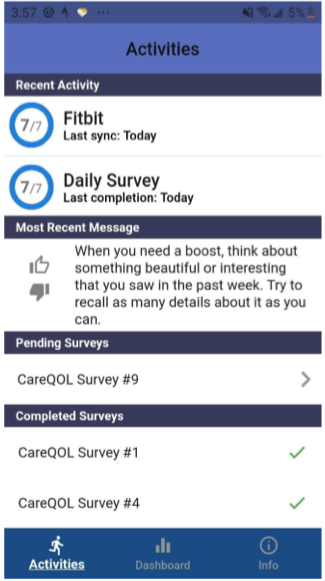Abstract
Background: Informal family care partners of persons with traumatic brain injury (TBI) are often faced with considerable physical and emotional stress resulting from their caregiver role. Low burden interventions are needed to improve the health-related quality of life (HRQOL) of these individuals.
Objective: We examined the effectiveness of a newly developed personalized health management intervention, called the just-in-time adaptive intervention (JITAI). This JITAI uses physical activity and sleep data from a Fitbit® and real-time self-reports of HRQOL collected via a mobile app (CareQOL app), to provide personalized feedback via app alert.
Methods: Participants are randomized to a control group, where they wear the Fitbit® and provide daily reports of HRQOL over a six-month period (without personalized feedback), or the JITAI group, where they wear the Fitbit®, provide daily reports of HRQOL and receive personalized pushes for 6 months. 240 participants will be enrolled (n=120 control; n=120 JITAI). Outcomes are collected at baseline, 1-, 2-, 3-, 4, 5- & 6-months, as well as 3- and 6-months post intervention. The primary objective is to examine the efficacy of the JITAI to improve caregiver strain of these care partners. Results: This trial opened for recruitment in November 2020. Data collection is expected to be complete by spring 2025, and the primary results are expected to be published in winter 2025.
Conclusions: This randomized control trial will determine if a JITAI will improve the HRQOL of care partners of persons with TBI and will identify those care partners at greatest risk for negative outcomes.
